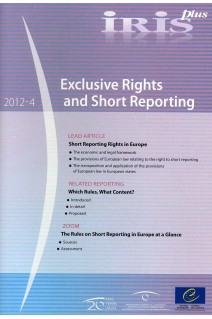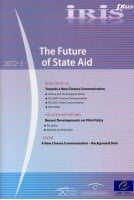- Online only



LEAD ARTICLE
Short Reporting Rights in Europe
European Legal Rules and their National Transposition and Application.
The right to short reporting is enshrined both in the Council of Europe's European Convention on Transfrontier Television and in the EU's Audiovisual Media Services Directive, and both legal bases are discussed in the lead article. The Directive provides for the EU member states themselves to detail the conditions to be met for the practical exercise of this right. The transposition of this EU law and the criteria that it establishes for the right to short reporting in European states are discussed in Part II.





Please note that in accordance with our terms & conditions, PDF/epubs may only be purchased by private individuals.
